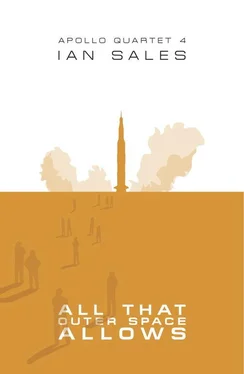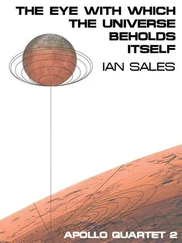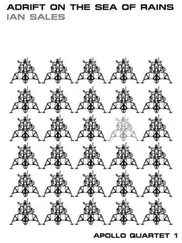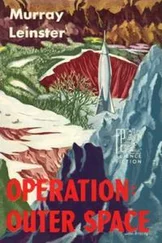The story was rejected by a number of magazines before Frederik Pohl took it for Galaxy. However, he asked for several changes before he would purchase it. In the original version, it was only the presence of women which was required to trigger the invisibility field. Pohl thought the story might have more impact if the presence of women and women only were needed for the invisibility to work, and asked Parker to rewrite the final third with that in mind. She did more than he had requested, however. Not only did she change the ending to imply that men would no longer be capable of waging war, in a bold move she also removed all the male characters’ names and referred to them only by their relationship to the female characters. Particularly interesting is the character Betty—possibly named for famous aerobatics pilot Betty Skelton—whom the men treat like one of their own, because she is a test pilot. And Betty in turn treats the wives in the same fashion as the men—except during that one moment of solidarity in the final paragraphs of the story.
There is a strange note of bitterness to Parker’s description of the relationship her protagonist, Suzanne, has with her husband. It is implied they have sex, and that it is not especially frequent in their marriage. Perhaps Parker intended this to be an ironic reflection of the husband’s failure with his secret project. But she also hints his moment of amorousness in the story is either a consequence of Suzanne’s appearance—she has dressed up for the wives’ social—or of the husband spending time in the social club bar with Betty.
“The Spaceships Men Don’t See” proved unpopular with many of the magazine’s readers, and one particularly scathing letter writer declared he was not interested in “womanly gossip and high heels”, and that readers of Galaxy, had they been interested in “women’s affairs” would be reading “a woman’s magazine”. Perhaps embarrassed at this vitriol, the editors did not reply to the letter and even neglected to mention that V. G. Parker was not male, as the correspondent had assumed, but female. However, it was likely Parker’s gender was known to most readers—she made no effort to hide it, unlike James Tiptree, Jr.—although there are no contemporary records of any science fiction fans, authors or editors actually meeting her in person. During the fifties and sixties, women were not common at conventions—and those that did attend were typically married to a fellow attendee, or had a professional relationship with the genre. Given that Parker’s husband was in the military, it’s reasonable to assume attendance at a convention would have been frowned upon, even if her husband had permitted it.
Despite the controversy following the publication of “The Spaceships Men Don’t See”, the story quickly vanished into obscurity. Feminist commentators have criticized it on a number of grounds. The female characters, although foregrounded in the narrative (it is their story, not their husbands’), have almost no agency. Even the story’s resolution is a consequence of their gender, rather than any action any of them have taken. The wives are also characterized by their clothing—in fact, the only colors mentioned, other than grey, refer to the garments worn by the women. It is likely Parker’s use of color was intended to be ironic, rather than pandering to nineteen-sixties conceptions of where women’s interests lay.
Parker’s final period was prompted by her husband’s selection as an astronaut by NASA. He eventually flew to the moon aboard Apollo 15. It is possible the response to “The Spaceships Men Don’t See” precipitated a new direction in Parker’s writing, and she chose to use her proximity to the space program to add a more marked technical sensibility to her science fictions, something not present in works by other women writers of the period—and this was a decade in which 250 women began writing for genre magazines. This level of technical detail reached an almost obsessive degree in her last published work, the novella “Hard Vacuum”, about a group of astronauts marooned at a lunar base. The science fiction written by women at this time, however, was considered to be “soft”, and despite her command of her subject, Parker had great difficulty breaking into the all-male “hard” science fiction club. She sold only three stories, in addition to her novella, and those sank without trace.
Parker stopped writing science fiction after the appearance of “Hard Vacuum”. Two space-related non-fiction works, and a co-writing credit on her husband’s autobiography, appeared during the following decade, before Parker finally faded from sight.
Ginny looks down at the sheet of paper she has just fed into the typewriter and she thinks about a title for this story she can feel taking shape in her mind. She thinks about the word “invisible” and its synonyms, but then she decides she needs to make invisibility an act , not a property—the ships are not hidden from sight, people simply do not see them .
She types,
THE SPACESHIPS MEN DON’T SEE
Yes, she likes that.
And on the next line,
by Virginia G. Parker
Her name, her byline. The letters which identify this story as something created by herself, even though she herself is a creation, a fictional construct. Virginia Grace Parker, who I named for three actresses of the 1950s—Virginia Leith, Grace Kelly and Suzy Parker—and whose life bears a passing resemblance, in parts, to those women I researched in the writing of this novel—especially Mary Irwin, wife of Apollo 15 astronaut James B Irwin, but also science fiction authors Judith Merril and Alice B Sheldon. However, Ginny Eckhardt née Parker is more than the sum of her inspirations, more than an invented history patchworked from the lives of others; and she leans forward and narrows her gaze as the first sentence of her story comes to her, and she types:
Once a month, the wives of the test pilots and engineers } met up{ gathered at the social club for coffee and conversation.
Walden is away at the Cape, she has not seen him since the weekend; and the small apartment is quiet. Ginny has her imagination, and a network of friends spread across the country, and she uses them to fill the empty hours. And, of course, there is the AWC, members of which are all too prone to drop by or telephone, to chat, to have a drink, coffee or something stronger, to just be company, whether she wants it or not. But somehow she has managed to free up today, although she has an appointment tomorrow at the beauty parlour so she will look her best when Walden flies home from the Cape on Saturday. For now, her thoughts are centred on the world of her heroine with the spaceship research pilot husband, a deliberate echoing of her own situation. She thinks about an invisible Navy destroyer in 1943, about pantyhose hanging from a line across the bathtub and lost earrings and women’s magazines sitting on coffee tables. She considers her role as an astronaut wife and the pressure to conform exerted by NASA and the other wives; and her mind is drawn to the Apollo spacecraft, the command module and lunar module, so exhaustively detailed in the manuals Walden studies so assiduously. She thinks about the fiction she has read in her magazines over the past six months, stories by Linda Marlowe, Kit Reed, Anne McCaffrey, Monica Sterba, Susan Trott, Betsy Curtis, Joan Patricia Basch…
And the words flow from her, this is one of the easiest stories she has ever written, perhaps because it had such a long gestation, perhaps because so much of herself is in it—and the narrative does not require those mental gymnastics she must usually perform if, say, her story were set among the crew of a spaceship on some endless voyage landing on an alien world for the first time. She is writing about the Astronaut Wives Club and the Apollo astronauts, although she knows no one reading this story—should she manage to sell it—will ever see the connection.
Читать дальше












